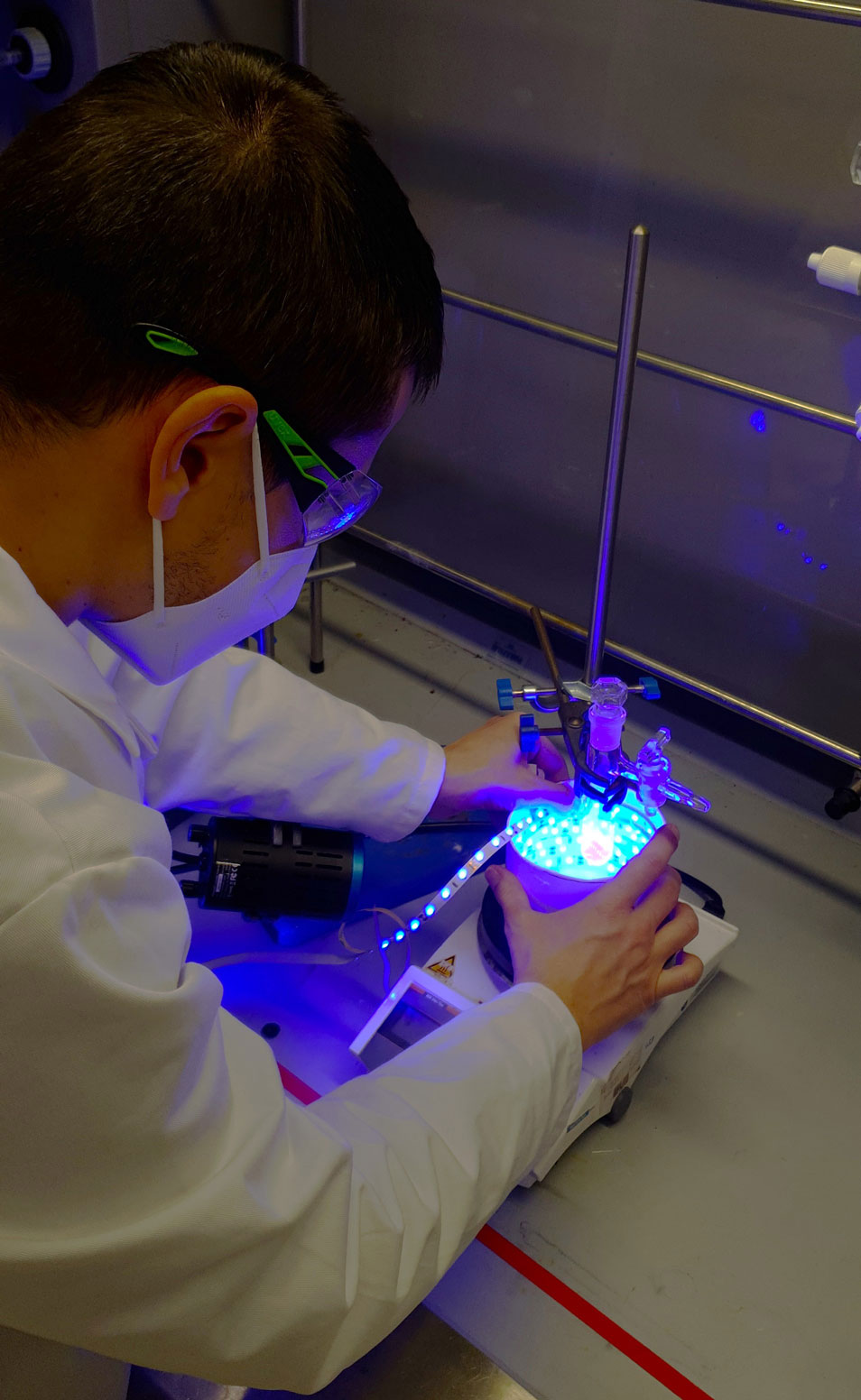Tuesday, 22 November 2022
Chemistry research at the University of Nottingham has been given a significant boost with €3m funding awarded to two projects to advance the fields of synthetic organic chemistry and materials science.
Dr Mattia Silvi and Dr Matthew Cliffe from the School of Chemistry successfully secured individual European Research Council (ERC) Starting Grants worth €1.5m each.
The ERC has awarded a total of €636m in Starting Grants spanning all disciplines of research. The grants aim to help excellent younger scientists launch their own projects, form their teams and pursue their most promising ideas.
 Visible light energy research has been funded as part of new ERC Starting Grant
Visible light energy research has been funded as part of new ERC Starting Grant
Dr Silvi’s research will focus on developing faster and more sustainable approaches for producing medicines and agrochemicals. The research will redesign the way molecules are constructed by defining a new strategy to cross-connect chemical structures. To achieve this the team will use visible light energy and metal-free methodologies in place of traditional toxic metal catalysts and lengthy chemical activation steps, typically required in traditional synthetic chemistry methods.
 Dr Mattia Silvi, School of Chemistry
Dr Mattia Silvi, School of Chemistry
Dr Silvi explains: “The design of novel medicines and agrochemicals generally requires the synthesis of bioactive molecules with tailored chemical and physical properties. Traditional synthetic chemistry methods involves long and cumbersome synthetic sequences, the use of toxic reagents and expensive catalysts, and only allow access to a limited structural diversity in target molecules. As a result, scientific progress in the design of novel bioactive molecules is generally limited to compounds that can be easily made, rather than by the scientist’s imagination. This new approach will allow us to expedite modification of complex bioactive molecules to design new analogues with tailored properties, opening a whole new panorama in the design of the medicines and the agrochemicals of tomorrow.”
Dr Matthew Cliffe will lead a research project that could revolutionise information technology through the development of new materials with quantum properties. The project will explore how adding controlled and small quantities of different atoms can enhance the quantum properties of metal-organic materials.
 Dr Matthew Cliffe, School of Chemistry
Dr Matthew Cliffe, School of Chemistry
Dr Cliffe explains: “Strongly correlated materials are the source of many of the biggest unsolved puzzles in physics and could potentially revolutionise information technology, through robust quantum computation, spintronics or superconductivity. Creating new materials which have the precise combination of interactions needed to create these quantum properties is remains an outstanding challenge. Metal-organic magnetic and conductive materials (where metal atoms are joined together by organic molecules to make crystals) are one of the most exciting classes of these strongly correlated materials, in part because we can take advantage of both the diversity of organic chemistry as well as the potential of inorganic chemistry.”
The ERC is the premier European funding organisation for excellent frontier research. It funds creative researchers of any nationality and age, to run projects based across Europe. The ERC offers 4 main grant schemes: Starting Grants, Consolidator Grants, Advanced Grants and Synergy Grants.
These awards are highly competitive so winning one in a School would be a big deal, but winning two in the same round in the same subject is probably unprecedented so we are delighted that Mattia and Matthew have been successful. Both projects are pushing the boundaries of the discipline to find new methods and techniques that will accelerate key areas in Chemistry.
President of the European Research Council Prof. Maria Leptin said: “It is a pleasure to see this new group of bright minds at the start of their careers, set to take their research to new heights. I cannot emphasise enough that Europe as a whole - both at national and at EU level - has to continue to back and empower its promising talent. We must encourage young researchers who are led by sheer curiosity to go after their most ambitious scientific ideas. Investing in them and their frontier research is investing in our future.”
Story credits
More information is available from Jane Icke, Media Relations Manager in the Press Office at the University of Nottingham, on (0)115 74 84417,
Notes to editors:
About the University of Nottingham
Ranked 24 in Europe and 15th in the UK by the QS World University Rankings: Europe 2024, the University of Nottingham is a founding member of Russell Group of research-intensive universities. Studying at the University of Nottingham is a life-changing experience, and we pride ourselves on unlocking the potential of our students. We have a pioneering spirit, expressed in the vision of our founder Sir Jesse Boot, which has seen us lead the way in establishing campuses in China and Malaysia - part of a globally connected network of education, research and industrial engagement.
Nottingham was crowned Sports University of the Year by The Times and Sunday Times Good University Guide 2024 – the third time it has been given the honour since 2018 – and by the Daily Mail University Guide 2024.
The university is among the best universities in the UK for the strength of our research, positioned seventh for research power in the UK according to REF 2021. The birthplace of discoveries such as MRI and ibuprofen, our innovations transform lives and tackle global problems such as sustainable food supplies, ending modern slavery, developing greener transport, and reducing reliance on fossil fuels.
The university is a major employer and industry partner - locally and globally - and our graduates are the third most targeted by the UK's top employers, according to The Graduate Market in 2024 report by High Fliers Research.
We lead the Universities for Nottingham initiative, in partnership with Nottingham Trent University, a pioneering collaboration between the city’s two world-class institutions to improve levels of prosperity, opportunity, sustainability, health and wellbeing for residents in the city and region we are proud to call home.
More news…